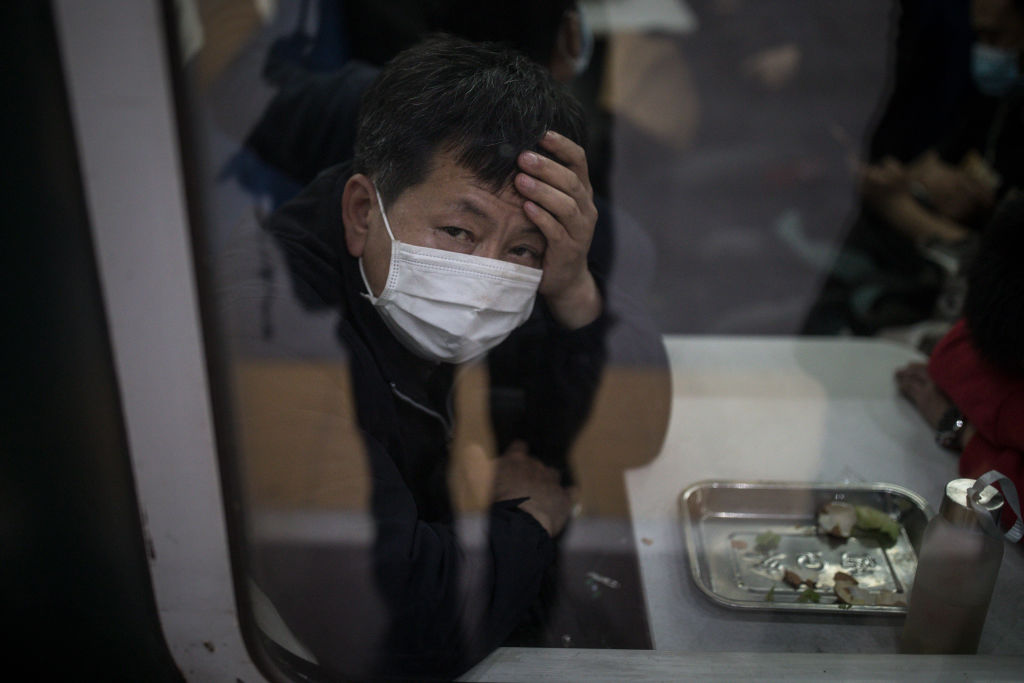China secretly prepared for a pandemic as tens of thousands of people dined together in Wuhan, AP reports


A free daily email with the biggest news stories of the day – and the best features from TheWeek.com
You are now subscribed
Your newsletter sign-up was successful
There was compelling evidence by late December that the new coronavirus in Wuhan, China, was spreading from person to person, but Chinese officials didn't take the threat of a significant outbreak seriously until the coronavirus was detected in Thailand on Jan. 13, The Associated Press reports, citing internal documents and interviews with Chinese officials. Top officials in Beijing started preparing for a pandemic on Jan. 14, but secretly, keeping the public in the dark as the virus spread for six days. President Xi Jinping issued a televised warning on Jan. 20, at which point more than 3,000 people had been infected.
Chinese officials spent the six days distributing test kits to trace the virus nationwide, ordering wider screening of patients, preparing hospitals for an infectious virus, and easing the stringent rules for confirming coronavirus infections, AP reports. During that week, Wuhan "hosted a mass banquet for tens of thousands of people" and "millions began traveling through for Lunar New Year celebrations."
"If they took action six days earlier, there would have been much fewer patients and medical facilities would have been sufficient," Zuo-Feng Zhang, an epidemiologist at the University of California, Los Angeles, told AP. "We might have avoided the collapse of Wuhan's medical system," and lives would have been saved. Researchers later estimated that if the public had been warned a week earlier and told to wear masks, forego travel, and social-distance, cases could have been cut by up to two-thirds.
The Week
Escape your echo chamber. Get the facts behind the news, plus analysis from multiple perspectives.

Sign up for The Week's Free Newsletters
From our morning news briefing to a weekly Good News Newsletter, get the best of The Week delivered directly to your inbox.
From our morning news briefing to a weekly Good News Newsletter, get the best of The Week delivered directly to your inbox.
China denies that it hid the outbreak early on, and some outside experts argue that Beijing's actions were defensible given its private actions and the risk of provoking unnecessary hysteria. "But the early story of the pandemic in China shows missed opportunities at every step," AP reports. "Under Xi, China's most authoritarian leader in decades, increasing political repression has made officials more hesitant to report cases without a clear green light from the top." Read more at The Associated Press.
A free daily email with the biggest news stories of the day – and the best features from TheWeek.com
Peter has worked as a news and culture writer and editor at The Week since the site's launch in 2008. He covers politics, world affairs, religion and cultural currents. His journalism career began as a copy editor at a financial newswire and has included editorial positions at The New York Times Magazine, Facts on File, and Oregon State University.
-
 The ‘ravenous’ demand for Cornish minerals
The ‘ravenous’ demand for Cornish mineralsUnder the Radar Growing need for critical minerals to power tech has intensified ‘appetite’ for lithium, which could be a ‘huge boon’ for local economy
-
 Why are election experts taking Trump’s midterm threats seriously?
Why are election experts taking Trump’s midterm threats seriously?IN THE SPOTLIGHT As the president muses about polling place deployments and a centralized electoral system aimed at one-party control, lawmakers are taking this administration at its word
-
 ‘Restaurateurs have become millionaires’
‘Restaurateurs have become millionaires’Instant Opinion Opinion, comment and editorials of the day
-
 Nobody seems surprised Wagner's Prigozhin died under suspicious circumstances
Nobody seems surprised Wagner's Prigozhin died under suspicious circumstancesSpeed Read
-
 Western mountain climbers allegedly left Pakistani porter to die on K2
Western mountain climbers allegedly left Pakistani porter to die on K2Speed Read
-
 'Circular saw blades' divide controversial Rio Grande buoys installed by Texas governor
'Circular saw blades' divide controversial Rio Grande buoys installed by Texas governorSpeed Read
-
 Los Angeles city workers stage 1-day walkout over labor conditions
Los Angeles city workers stage 1-day walkout over labor conditionsSpeed Read
-
 Mega Millions jackpot climbs to an estimated $1.55 billion
Mega Millions jackpot climbs to an estimated $1.55 billionSpeed Read
-
 Bangladesh dealing with worst dengue fever outbreak on record
Bangladesh dealing with worst dengue fever outbreak on recordSpeed Read
-
 Glacial outburst flooding in Juneau destroys homes
Glacial outburst flooding in Juneau destroys homesSpeed Read
-
 Scotland seeking 'monster hunters' to search for fabled Loch Ness creature
Scotland seeking 'monster hunters' to search for fabled Loch Ness creatureSpeed Read
